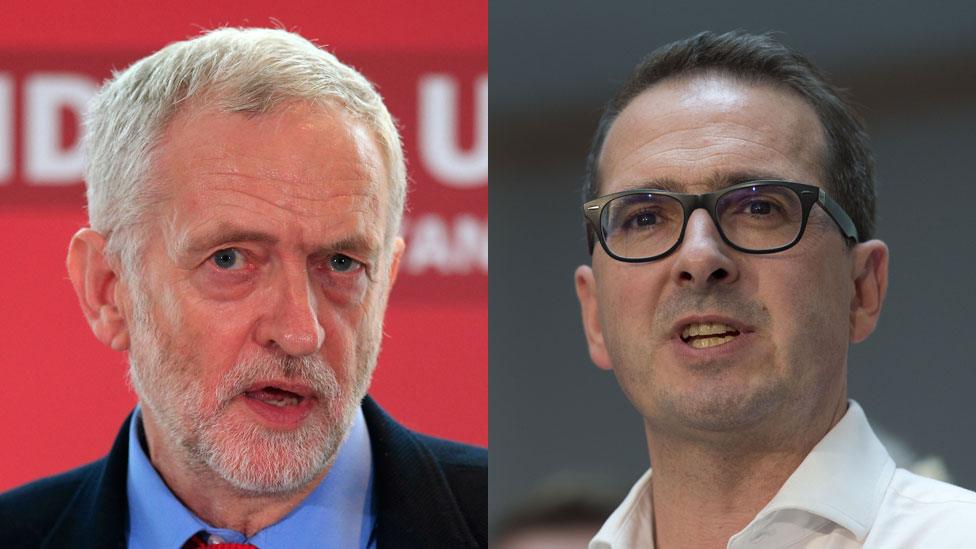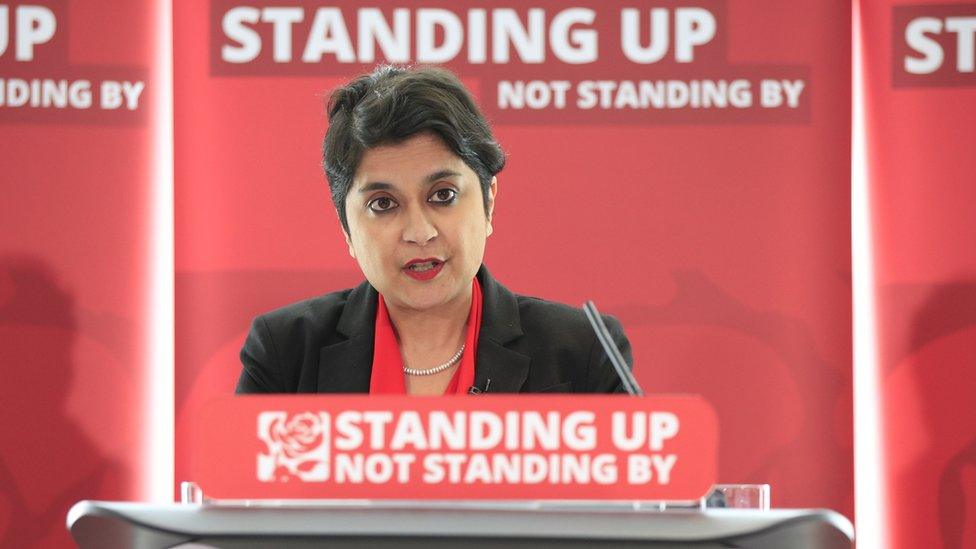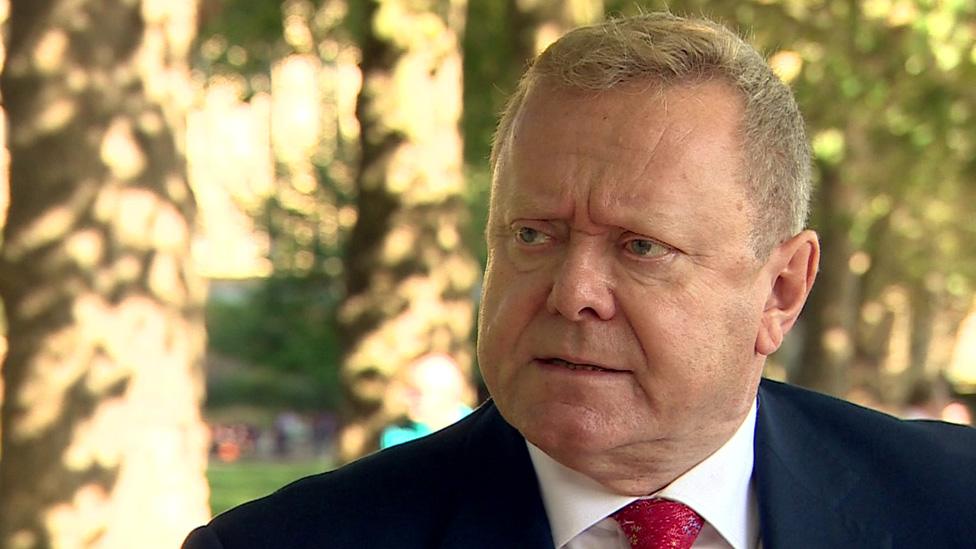Labour leadership: Corbyn appeals for unity after re-election
- Published
Jeremy Corbyn: Let's wipe that slate clean, from today, and get on with the work we have got to do as a party together
Jeremy Corbyn has been re-elected as Labour leader, comfortably defeating his challenger Owen Smith.
He won 61.8% of the vote, a larger margin of victory than last year.
He vowed to bring Labour back together, saying "we have much more in common than divides us", insisting the party could win the next election as the "engine of progress" in the country.
More than half a million party members, trade unionists and registered supporters voted in the contest.
In a result announced on the eve of Labour's party conference in Liverpool, Mr Corbyn won 313,209 votes, compared with Mr Smith's 193,229.
Speaking to the BBC's Laura Kuenssberg after his victory, Mr Corbyn said the debate about who led the party was "now over" and Labour needed to take its message on the economy, education and the NHS to the country.
Asked what steps he would take to reconcile critical MPs, he said some form of elections to the shadow cabinet were "absolutely in the mix" although he declined to rule out the possible deselection of sitting MPs in the run-up to the next election.
"I think you will see a lot of changes over the next few weeks," he said.
"They (MPs) have no need to worry at all because it is all about democracy. We are all democratically accountable to our party and to our constituents. They have no need to worry at all. I am reaching out."

Analysis
Jeremy Corbyn tells BBC political editor Laura Kuenssberg he aims to unite the party
by Laura Kuenssberg, BBC political editor
Victory will be sweet - not just because it is a confirmation of his remarkable support among thousands upon thousands of members around the country.
It is Mr Corbyn's second defeat of the Labour establishment, who many of his supporters believe have tried to undermine the leader consistently over the last 12 months.
They talk of a "surge in the purge" as the leadership contest progressed - party officials vetting and checking new supporters who had registered to vote.
There are claims that Labour HQ deliberately threw Corbyn supporters off the voting lists to reduce the size of his victory. Corbyn supporters believe many MPs have done nothing in the past year other than try to damage his leadership and today they will be shown to have failed badly in their attempt to oust him.

In his acceptance speech, Mr Corbyn said he was "honoured" to have been elected in a contest that followed months of tension with many Labour MPs and urged people to "respect the democratic choice that has been made".
Addressing supporters, Mr Corbyn said he and his opponents were part of the "same Labour family" and everyone needed to focus their energy "on exposing and defeating the Tories".
"We have much more in common than divides us," he said. "Let us wipe that slate clean from today and get on with the work that we have to do as a party," he said.
Labour leadership: Jeremy Corbyn profile
Labour leadership contest: Owen Smith profile
Recognising that the election had been "partisan", he condemned online abuse of Labour MPs and supporters which he said "demeaned and corroded" the party.
Mr Smith, who had previously ruled out returning to the front bench, said he respected the result and the onus was on Mr Corbyn to "heal divisions and unite our movement".
"Jeremy has won the contest," he said. "He now has to win the country and he will have my support in trying to do so."
The result in focus
Mr Corbyn was first elected Labour leader in September 2015, when he beat three other candidates and got 59.5% of the vote.
Turnout was higher this time around, with 77.6% of the 654,006 eligible party members, trade union members and registered supporters - 506,438 in total - confirmed as taking part.
Mr Corbyn won comfortably in each of the three categories - winning the support of 59% of party members, 70% of registered supporters and 60% of affiliated supporters.
Party members - Jeremy Corbyn (168,216); Owen Smith (116,960)
Registered supporters - Corbyn (84,918); Smith (36,599)
Affiliated supporters - Corbyn (60,075); Smith (39,670)
Despite winning the leadership in a vote of the wider membership and registered supporters last year Mr Corbyn, who spent three decades as part of a marginalised leftwing group of Labour MPs in Parliament, has never had the support of more than about 20% of Labour's MPs.
And the contest came about after more than 170 MPs supported a motion of no confidence in their leader - that confidence vote came after dozens quit his shadow cabinet and other frontbench roles.
There has been speculation that a number of critical Labour MPs could return in an attempt to heal the divisions over the party's future direction although a number are only prepared to do so if elections to the shadow cabinet - which were scrapped in 2011 in favour of the leader picking his own team - are reinstated.
Sources have told the BBC that there was a brief discussion of the issue at a meeting of Labour's ruling National Executive Committee on Saturday evening but no conclusions were reached and none are likely this week.
'Unity and stability'
Saturday's result was welcomed by leading trade unions while Momentum - the campaign group spawned by Mr Corbyn's victory last year - hailed it as a "fantastic win".
Shadow health secretary Diane Abbott, a key ally of the leader, said opponents of Mr Corbyn had "thrown everything but the kitchen sink" at him.
"It was a hard campaign but the membership came out for Jeremy because they realised he had not been given a chance and had been treated unfairly," she said.
Chuka Umunna says unity "will not come about through demand, through threat, through online thuggery"
Shadow Chancellor John McDonnell says he thinks the Conservatives will call an early election
Shadow chancellor John McDonnell said it was up to Mr Corbyn's critics to decide whether they wanted to serve under him, insisting he wanted "unity and stability" and there was a "way we can accommodate everybody".
Labour MP Chuku Umunna said the "leadership issue was settled" and Mr Corbyn, through his re-election, was the party's "candidate to be prime minister".
Former leader Ed Miliband said it was "time to unite and focus on the country".
But Labour MP Louise Ellman said Mr Corbyn must appeal to more than his "cheering fans" and the public at large weren't "impressed with him and that needs to change".
"It's no good being surrounded by people who already agree with you. That is not enough."
Rival parties react
The Conservatives said Mr Corbyn's re-election would not end the "bitter power struggle" within the opposition.
"172 Labour MPs don't think Jeremy Corbyn can lead the Labour Party - so how can he lead the country?" said party chairman Patrick McLoughlin.
The Lib Dems said Mr Corbyn was an "ineffectual leader" who had failed to stand up for the national interest during the EU referendum.
The Green Party was more conciliatory, offering the leader their congratulations.
"We look forward to working with Jeremy to oppose the Conservatives and to bring about a progressive government at the next election," said co-leader Caroline Lucas.
But UKIP leader Diane James tweeted, external: "The millions of Labour voters who want to see immigration cut and Brexit delivered are welcome in UKIP."
- Published21 September 2016

- Published23 September 2016

- Published23 September 2016
